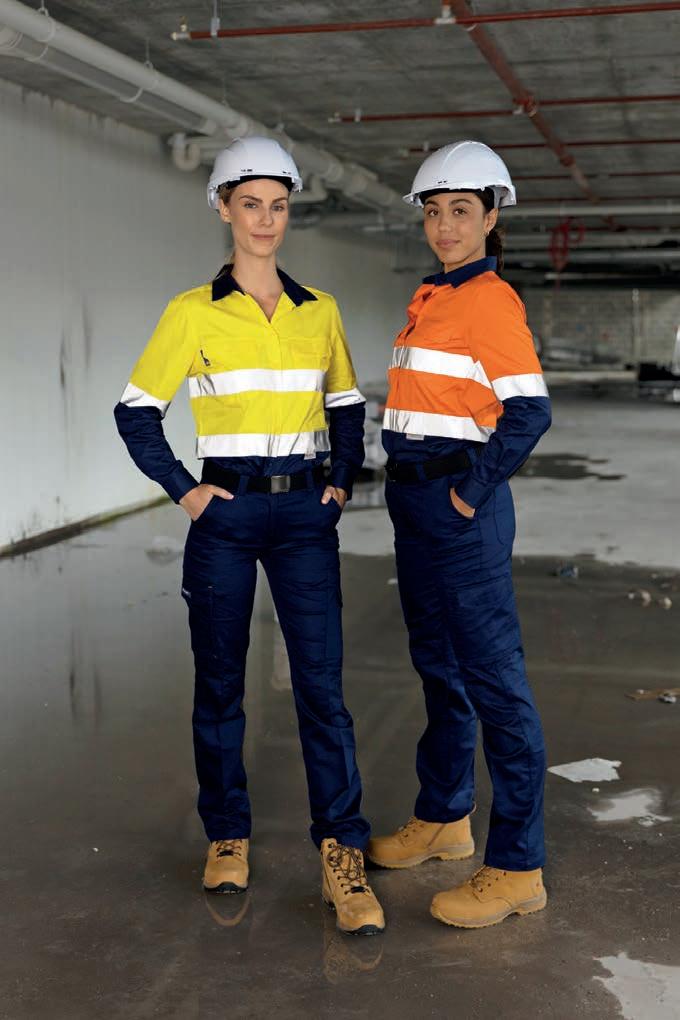
3 minute read
Workwear fit for women
As we continue to see an increase in diversity and inclusion in the Australian construction industry, Blackwoods is championing gender equality with workwear tailored to women.
In support of diversity and inclusion, the team at Blackwoods believes gender shouldn’t be a trade-off for comfort on the jobsite. Blackwoods is one of Australia’s largest providers of industrial and safety supplies and the company strives to partner with brands that embrace an industry wide culture of balance and inclusion.
The company’s extensive range of workwear from some of the construction industry’s inclusive workwear and says she’s proud to be a part of a company driving equality in the industry.
“At Blackwoods we’re conscious of the ever-changing face of the construction and infrastructure industries,” says Eam. “It’s terrific to see gender parity in apparel and footwear is now a reality.”
“It not only means greater comfort and inclusion for women, it’s also about greater productivity on the jobsite.”
Wearing ill-fitting clothes and not having the correct work uniform can make you feel uncomfortable and out of place; and this is just as prevalent on the jobsite. It’s hard to perform at your best when you don’t feel comfortable with what you are wearing.
Further, for construction professionals, physical tasks demand that you be mobile, agile, and not restricted by your apparel. Plus, having the same workwear as your colleagues allows you to feel a part of the team and gives you a sense of belonging. Yet women’s workwear in the trade industries has often fallen short.
“With the recent pandemic and a dire skill shortage across the board, an increasing focus is being placed on recruiting and supporting women as they transition into trade roles,” says Eam.
“Not only does greater female representation across the construction industry help reduce a staffing gap, but concrete evidence suggests that having more women on the team increases an organisation’s productivity, profitability and improves workplace culture.”
A study by Workplace Gender Equality Agency (WGEA) and Bankwest Curtin Economics Centre (BCEC) looked at 4,841 reports submitted by Australian businesses capturing the data of roughly 4.3 million employees. The results showed that an increased share of 10 percentage points of top-tier female managers led to an increase of 6.6 per cent in the market value of ASX-listed companies – which equated to around $104.7 million.
Another study conducted by McKinsey & Company showed companies that had greater workplace gender diversity were up to 21 per cent more profitable. Yet, in the male-dominated trade industries in Australia women make up only 2 per cent of the workforce.
“To help reduce the diversity gap and encourage women to consider a career in trade, state governments across Australia are implementing plans to support access to training and encourage women to stay in the industry long term,” says Eam. “In 2020, the NSW Government announced it was launching a Trade Pathways for Women program to offer supported and accessible pathways to trade careers for women and improve their access to training with fee-free options.”
The Victorian Government, with the help of the Building Industry Consultative Council (BICC), has launched the Building Gender Equality: Victoria’s Women in Construction Strategy 2019-2022. This mandates that state construction projects have female representation in at least 3 per cent of trade roles, 7 per cent of non-trade roles and 35 per cent of management, supervisory or specialist roles. High-level changes like these are a great step in the right direction, but more work needs to be done to promote gender equality in the workplace on a more individual or company level.
Dr Phillippa Carnemolla is a Senior Research Fellow at the University of Technology Sydney, who studied female high school students’ perceptions of the construction industry. She points to the need for female role models in leadership positions, better career guidance in schools that show trades as a viable option for women, and for leading companies to reform their company culture to be more inclusive.
A simple way that women can feel more included and comfortable on the worksite is to have fit-for-purpose apparel. A company leading the way in developing specific workwear tailored to women is Blackwoods supplier Workwear Group, across both its KingGee and Hard Yakka brands.
Peter Allery, National Sales Manager, Safety at Workwear Group says the company recognises the importance of having a diverse and equal workforce.
“We recognise women are becoming an integral part of the industrial workplace, as such makes complete sense to have the right apparel and footwear to suit individual needs, irrespective of gender,” says Allery.
“Each brand has reviewed its range of workwear and high visibility clothing to design them for women’s figures and take into consideration comfort, fit and covering modesty areas effectively.
“This means female tradies can get stuck in and feel confident and at ease on the jobsite.”
KingGee has committed to ensuring there is a female equivalent of every male garment in its range. New features include pants in two cuts to suit different body types (straight and curved); a women’s style in the fleece and puffer jacket range; and a new stretch denim style to accommodate fit and boot height.
Whether you’re on the jobsite, in the office or on the road, the team at Blackwoods believes every worker should feel safe, included and part of the team.
Eam says: “While there is a long way to go to get to gender parity in the trade industries, getting women the right workwear is a first step towards a more equal and balanced workplace.”
Check out the Blackwoods Uniform Solutions Guide at www.blackwoods.com.au








